Analysing Organisational Behaviour at TESCO: A Comprehensive Report
VerifiedAdded on 2021/02/20
|16
|5012
|25
Report
AI Summary
This report provides an in-depth analysis of organisational behaviour within TESCO, a multinational retailer. It examines the influence of organisational culture, politics, and power on individual and team performance. The report explores Hofstede's cultural dimensions and Handy's model to understand TESCO's organisational culture, along with the application of different types of power (legitimate, expert, referent, coercive, and reward). Furthermore, it delves into the application of content and process theories of motivation, including Vroom's Expectancy Theory and Adam's Equity Theory, to achieve organisational goals. The report also touches upon the factors that contribute to effective versus ineffective teams, providing a comprehensive overview of organisational behaviour concepts within a real-world business context. Finally, the report offers recommendations based on the analysis of the case study.
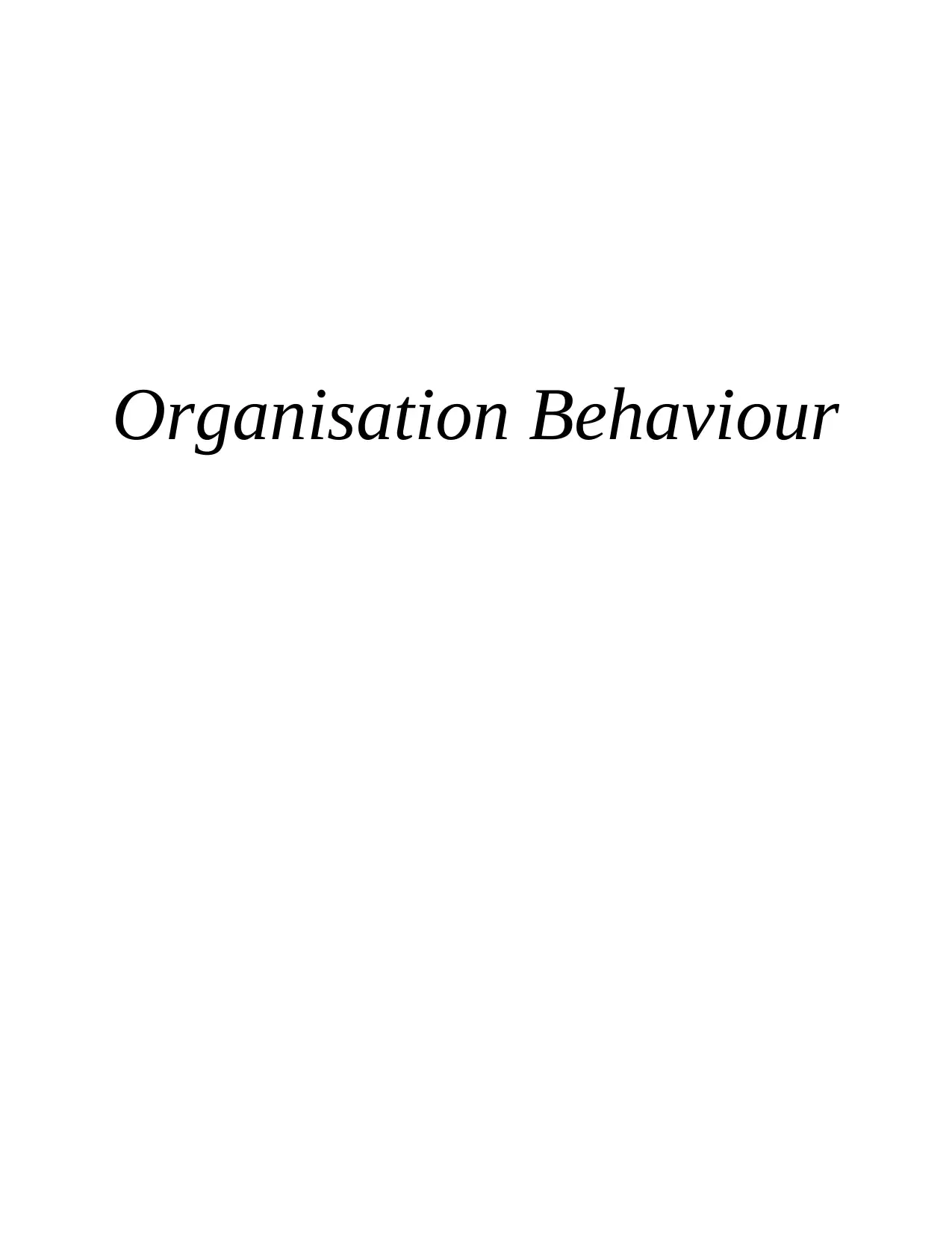
Organisation Behaviour
Paraphrase This Document
Need a fresh take? Get an instant paraphrase of this document with our AI Paraphraser
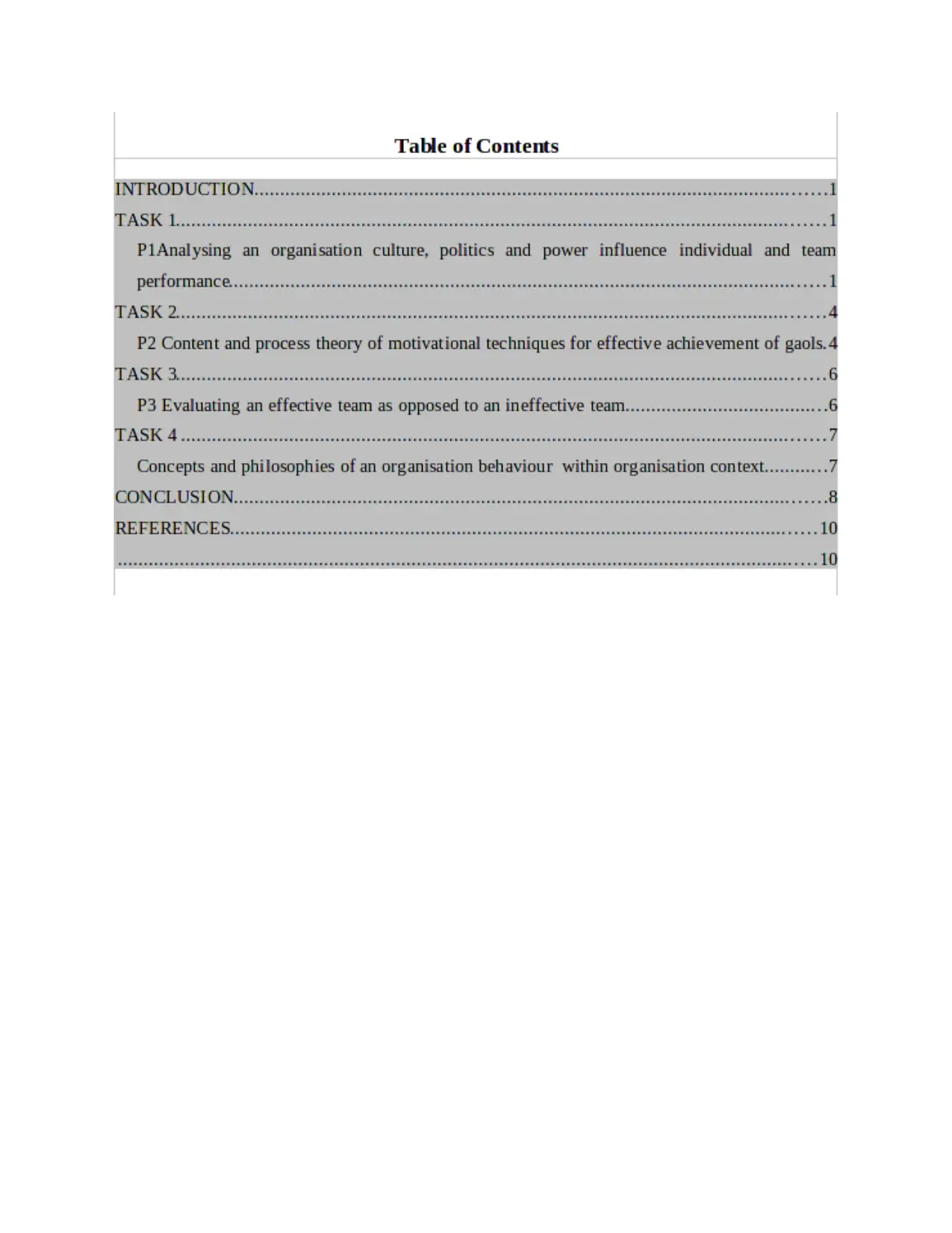
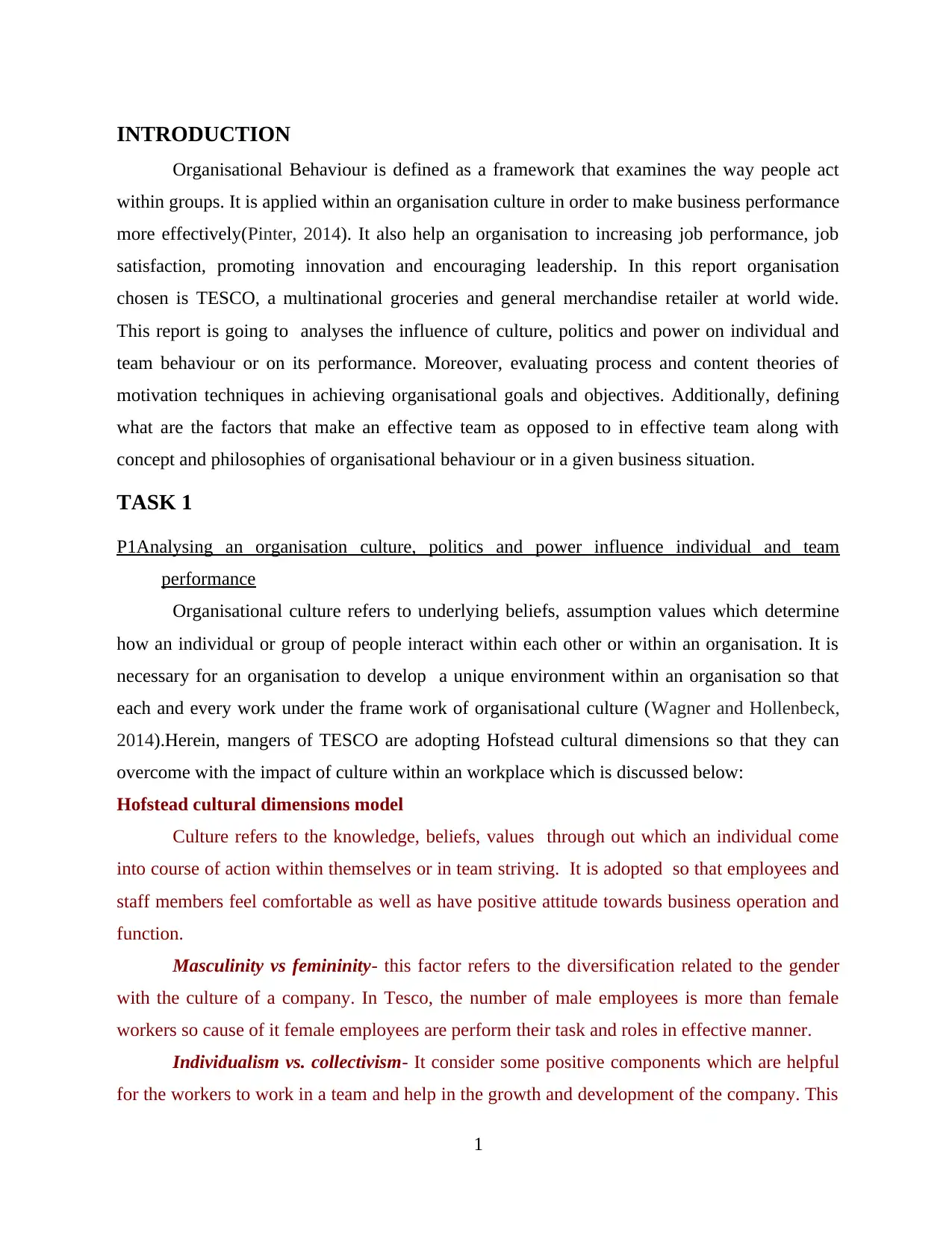
INTRODUCTION
Organisational Behaviour is defined as a framework that examines the way people act
within groups. It is applied within an organisation culture in order to make business performance
more effectively(Pinter, 2014). It also help an organisation to increasing job performance, job
satisfaction, promoting innovation and encouraging leadership. In this report organisation
chosen is TESCO, a multinational groceries and general merchandise retailer at world wide.
This report is going to analyses the influence of culture, politics and power on individual and
team behaviour or on its performance. Moreover, evaluating process and content theories of
motivation techniques in achieving organisational goals and objectives. Additionally, defining
what are the factors that make an effective team as opposed to in effective team along with
concept and philosophies of organisational behaviour or in a given business situation.
TASK 1
P1Analysing an organisation culture, politics and power influence individual and team
performance
Organisational culture refers to underlying beliefs, assumption values which determine
how an individual or group of people interact within each other or within an organisation. It is
necessary for an organisation to develop a unique environment within an organisation so that
each and every work under the frame work of organisational culture (Wagner and Hollenbeck,
2014).Herein, mangers of TESCO are adopting Hofstead cultural dimensions so that they can
overcome with the impact of culture within an workplace which is discussed below:
Hofstead cultural dimensions model
Culture refers to the knowledge, beliefs, values through out which an individual come
into course of action within themselves or in team striving. It is adopted so that employees and
staff members feel comfortable as well as have positive attitude towards business operation and
function.
Masculinity vs femininity- this factor refers to the diversification related to the gender
with the culture of a company. In Tesco, the number of male employees is more than female
workers so cause of it female employees are perform their task and roles in effective manner.
Individualism vs. collectivism- It consider some positive components which are helpful
for the workers to work in a team and help in the growth and development of the company. This
1
Organisational Behaviour is defined as a framework that examines the way people act
within groups. It is applied within an organisation culture in order to make business performance
more effectively(Pinter, 2014). It also help an organisation to increasing job performance, job
satisfaction, promoting innovation and encouraging leadership. In this report organisation
chosen is TESCO, a multinational groceries and general merchandise retailer at world wide.
This report is going to analyses the influence of culture, politics and power on individual and
team behaviour or on its performance. Moreover, evaluating process and content theories of
motivation techniques in achieving organisational goals and objectives. Additionally, defining
what are the factors that make an effective team as opposed to in effective team along with
concept and philosophies of organisational behaviour or in a given business situation.
TASK 1
P1Analysing an organisation culture, politics and power influence individual and team
performance
Organisational culture refers to underlying beliefs, assumption values which determine
how an individual or group of people interact within each other or within an organisation. It is
necessary for an organisation to develop a unique environment within an organisation so that
each and every work under the frame work of organisational culture (Wagner and Hollenbeck,
2014).Herein, mangers of TESCO are adopting Hofstead cultural dimensions so that they can
overcome with the impact of culture within an workplace which is discussed below:
Hofstead cultural dimensions model
Culture refers to the knowledge, beliefs, values through out which an individual come
into course of action within themselves or in team striving. It is adopted so that employees and
staff members feel comfortable as well as have positive attitude towards business operation and
function.
Masculinity vs femininity- this factor refers to the diversification related to the gender
with the culture of a company. In Tesco, the number of male employees is more than female
workers so cause of it female employees are perform their task and roles in effective manner.
Individualism vs. collectivism- It consider some positive components which are helpful
for the workers to work in a team and help in the growth and development of the company. This
1
⊘ This is a preview!⊘
Do you want full access?
Subscribe today to unlock all pages.

Trusted by 1+ million students worldwide
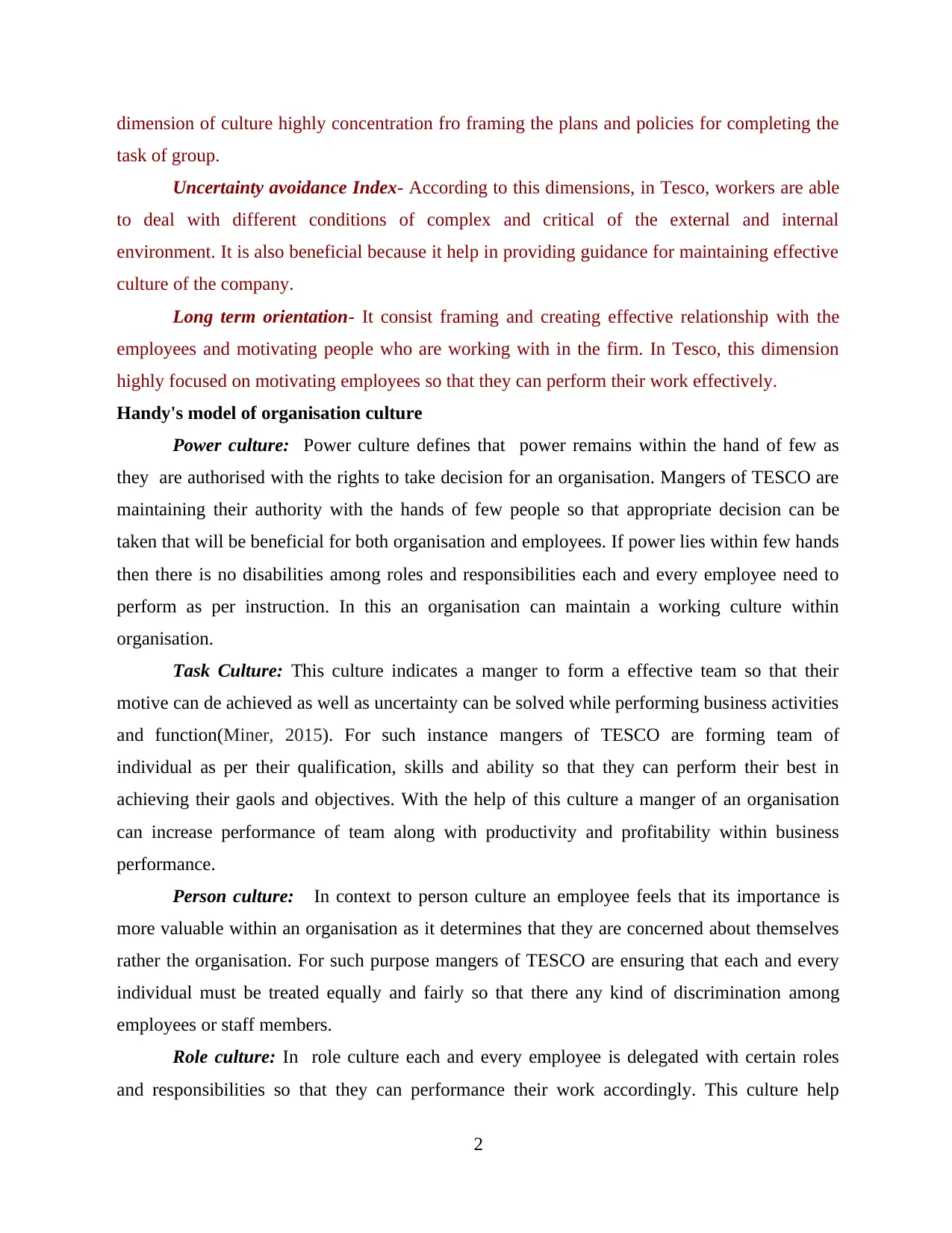
dimension of culture highly concentration fro framing the plans and policies for completing the
task of group.
Uncertainty avoidance Index- According to this dimensions, in Tesco, workers are able
to deal with different conditions of complex and critical of the external and internal
environment. It is also beneficial because it help in providing guidance for maintaining effective
culture of the company.
Long term orientation- It consist framing and creating effective relationship with the
employees and motivating people who are working with in the firm. In Tesco, this dimension
highly focused on motivating employees so that they can perform their work effectively.
Handy's model of organisation culture
Power culture: Power culture defines that power remains within the hand of few as
they are authorised with the rights to take decision for an organisation. Mangers of TESCO are
maintaining their authority with the hands of few people so that appropriate decision can be
taken that will be beneficial for both organisation and employees. If power lies within few hands
then there is no disabilities among roles and responsibilities each and every employee need to
perform as per instruction. In this an organisation can maintain a working culture within
organisation.
Task Culture: This culture indicates a manger to form a effective team so that their
motive can de achieved as well as uncertainty can be solved while performing business activities
and function(Miner, 2015). For such instance mangers of TESCO are forming team of
individual as per their qualification, skills and ability so that they can perform their best in
achieving their gaols and objectives. With the help of this culture a manger of an organisation
can increase performance of team along with productivity and profitability within business
performance.
Person culture: In context to person culture an employee feels that its importance is
more valuable within an organisation as it determines that they are concerned about themselves
rather the organisation. For such purpose mangers of TESCO are ensuring that each and every
individual must be treated equally and fairly so that there any kind of discrimination among
employees or staff members.
Role culture: In role culture each and every employee is delegated with certain roles
and responsibilities so that they can performance their work accordingly. This culture help
2
task of group.
Uncertainty avoidance Index- According to this dimensions, in Tesco, workers are able
to deal with different conditions of complex and critical of the external and internal
environment. It is also beneficial because it help in providing guidance for maintaining effective
culture of the company.
Long term orientation- It consist framing and creating effective relationship with the
employees and motivating people who are working with in the firm. In Tesco, this dimension
highly focused on motivating employees so that they can perform their work effectively.
Handy's model of organisation culture
Power culture: Power culture defines that power remains within the hand of few as
they are authorised with the rights to take decision for an organisation. Mangers of TESCO are
maintaining their authority with the hands of few people so that appropriate decision can be
taken that will be beneficial for both organisation and employees. If power lies within few hands
then there is no disabilities among roles and responsibilities each and every employee need to
perform as per instruction. In this an organisation can maintain a working culture within
organisation.
Task Culture: This culture indicates a manger to form a effective team so that their
motive can de achieved as well as uncertainty can be solved while performing business activities
and function(Miner, 2015). For such instance mangers of TESCO are forming team of
individual as per their qualification, skills and ability so that they can perform their best in
achieving their gaols and objectives. With the help of this culture a manger of an organisation
can increase performance of team along with productivity and profitability within business
performance.
Person culture: In context to person culture an employee feels that its importance is
more valuable within an organisation as it determines that they are concerned about themselves
rather the organisation. For such purpose mangers of TESCO are ensuring that each and every
individual must be treated equally and fairly so that there any kind of discrimination among
employees or staff members.
Role culture: In role culture each and every employee is delegated with certain roles
and responsibilities so that they can performance their work accordingly. This culture help
2
Paraphrase This Document
Need a fresh take? Get an instant paraphrase of this document with our AI Paraphraser
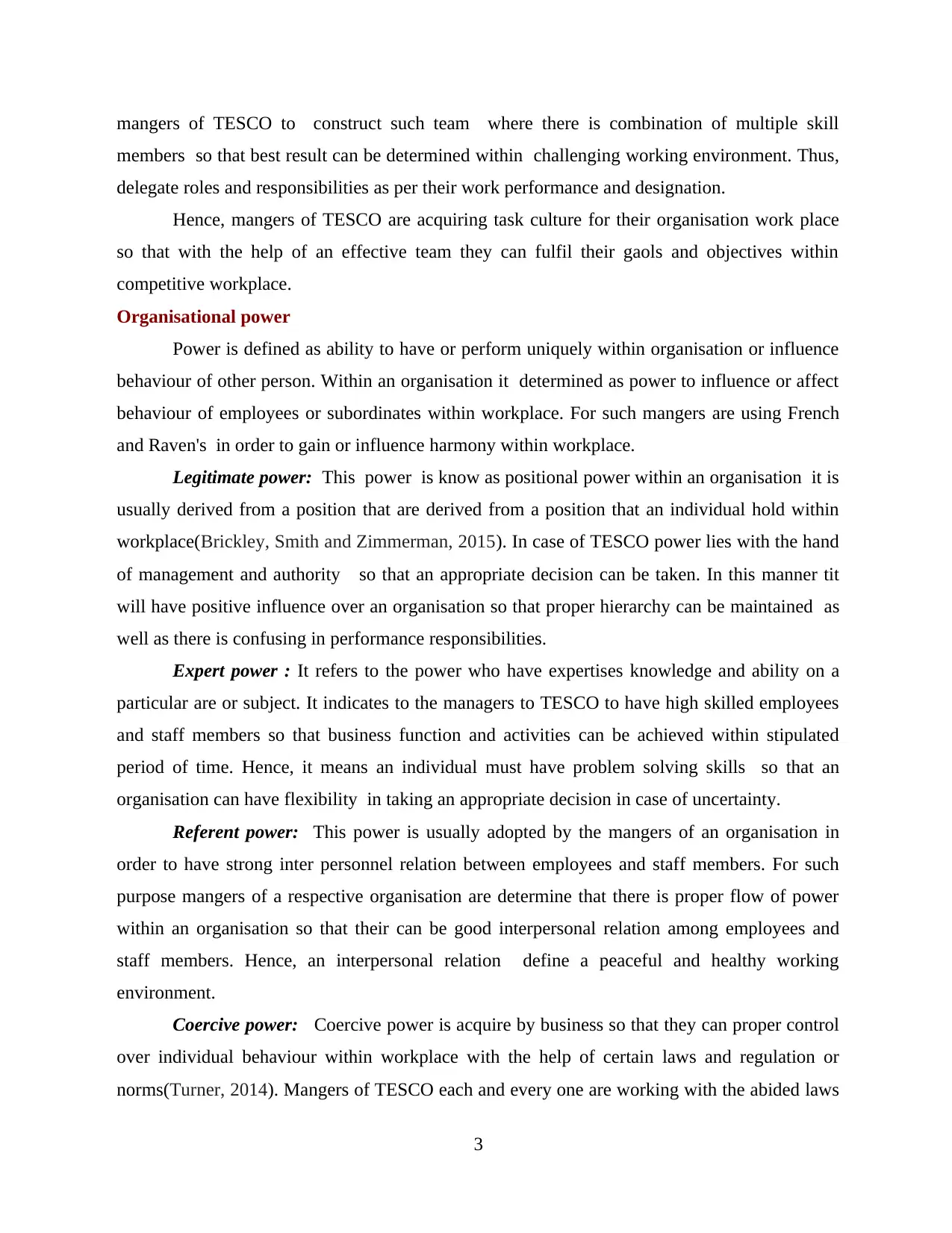
mangers of TESCO to construct such team where there is combination of multiple skill
members so that best result can be determined within challenging working environment. Thus,
delegate roles and responsibilities as per their work performance and designation.
Hence, mangers of TESCO are acquiring task culture for their organisation work place
so that with the help of an effective team they can fulfil their gaols and objectives within
competitive workplace.
Organisational power
Power is defined as ability to have or perform uniquely within organisation or influence
behaviour of other person. Within an organisation it determined as power to influence or affect
behaviour of employees or subordinates within workplace. For such mangers are using French
and Raven's in order to gain or influence harmony within workplace.
Legitimate power: This power is know as positional power within an organisation it is
usually derived from a position that are derived from a position that an individual hold within
workplace(Brickley, Smith and Zimmerman, 2015). In case of TESCO power lies with the hand
of management and authority so that an appropriate decision can be taken. In this manner tit
will have positive influence over an organisation so that proper hierarchy can be maintained as
well as there is confusing in performance responsibilities.
Expert power : It refers to the power who have expertises knowledge and ability on a
particular are or subject. It indicates to the managers to TESCO to have high skilled employees
and staff members so that business function and activities can be achieved within stipulated
period of time. Hence, it means an individual must have problem solving skills so that an
organisation can have flexibility in taking an appropriate decision in case of uncertainty.
Referent power: This power is usually adopted by the mangers of an organisation in
order to have strong inter personnel relation between employees and staff members. For such
purpose mangers of a respective organisation are determine that there is proper flow of power
within an organisation so that their can be good interpersonal relation among employees and
staff members. Hence, an interpersonal relation define a peaceful and healthy working
environment.
Coercive power: Coercive power is acquire by business so that they can proper control
over individual behaviour within workplace with the help of certain laws and regulation or
norms(Turner, 2014). Mangers of TESCO each and every one are working with the abided laws
3
members so that best result can be determined within challenging working environment. Thus,
delegate roles and responsibilities as per their work performance and designation.
Hence, mangers of TESCO are acquiring task culture for their organisation work place
so that with the help of an effective team they can fulfil their gaols and objectives within
competitive workplace.
Organisational power
Power is defined as ability to have or perform uniquely within organisation or influence
behaviour of other person. Within an organisation it determined as power to influence or affect
behaviour of employees or subordinates within workplace. For such mangers are using French
and Raven's in order to gain or influence harmony within workplace.
Legitimate power: This power is know as positional power within an organisation it is
usually derived from a position that are derived from a position that an individual hold within
workplace(Brickley, Smith and Zimmerman, 2015). In case of TESCO power lies with the hand
of management and authority so that an appropriate decision can be taken. In this manner tit
will have positive influence over an organisation so that proper hierarchy can be maintained as
well as there is confusing in performance responsibilities.
Expert power : It refers to the power who have expertises knowledge and ability on a
particular are or subject. It indicates to the managers to TESCO to have high skilled employees
and staff members so that business function and activities can be achieved within stipulated
period of time. Hence, it means an individual must have problem solving skills so that an
organisation can have flexibility in taking an appropriate decision in case of uncertainty.
Referent power: This power is usually adopted by the mangers of an organisation in
order to have strong inter personnel relation between employees and staff members. For such
purpose mangers of a respective organisation are determine that there is proper flow of power
within an organisation so that their can be good interpersonal relation among employees and
staff members. Hence, an interpersonal relation define a peaceful and healthy working
environment.
Coercive power: Coercive power is acquire by business so that they can proper control
over individual behaviour within workplace with the help of certain laws and regulation or
norms(Turner, 2014). Mangers of TESCO each and every one are working with the abided laws
3
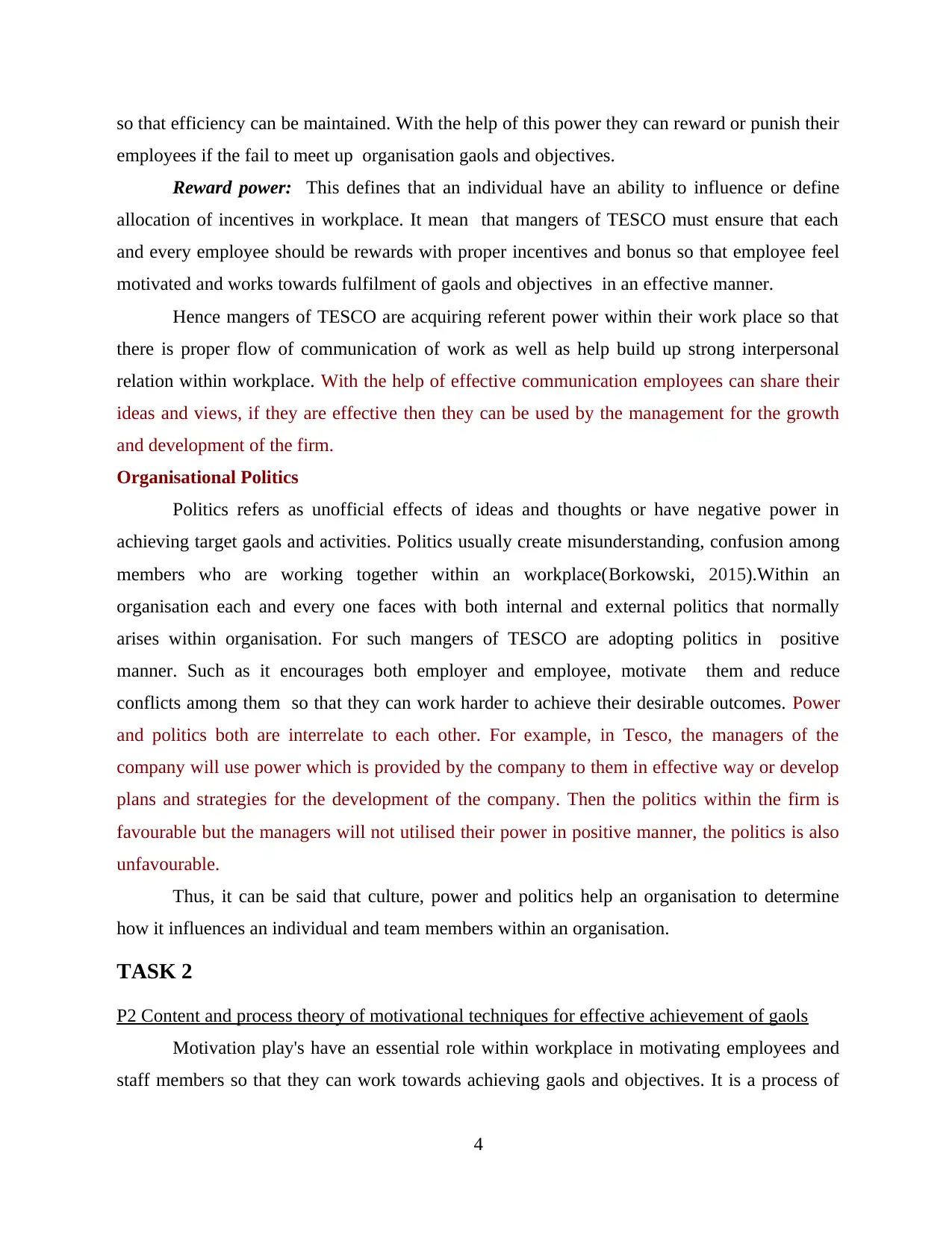
so that efficiency can be maintained. With the help of this power they can reward or punish their
employees if the fail to meet up organisation gaols and objectives.
Reward power: This defines that an individual have an ability to influence or define
allocation of incentives in workplace. It mean that mangers of TESCO must ensure that each
and every employee should be rewards with proper incentives and bonus so that employee feel
motivated and works towards fulfilment of gaols and objectives in an effective manner.
Hence mangers of TESCO are acquiring referent power within their work place so that
there is proper flow of communication of work as well as help build up strong interpersonal
relation within workplace. With the help of effective communication employees can share their
ideas and views, if they are effective then they can be used by the management for the growth
and development of the firm.
Organisational Politics
Politics refers as unofficial effects of ideas and thoughts or have negative power in
achieving target gaols and activities. Politics usually create misunderstanding, confusion among
members who are working together within an workplace(Borkowski, 2015).Within an
organisation each and every one faces with both internal and external politics that normally
arises within organisation. For such mangers of TESCO are adopting politics in positive
manner. Such as it encourages both employer and employee, motivate them and reduce
conflicts among them so that they can work harder to achieve their desirable outcomes. Power
and politics both are interrelate to each other. For example, in Tesco, the managers of the
company will use power which is provided by the company to them in effective way or develop
plans and strategies for the development of the company. Then the politics within the firm is
favourable but the managers will not utilised their power in positive manner, the politics is also
unfavourable.
Thus, it can be said that culture, power and politics help an organisation to determine
how it influences an individual and team members within an organisation.
TASK 2
P2 Content and process theory of motivational techniques for effective achievement of gaols
Motivation play's have an essential role within workplace in motivating employees and
staff members so that they can work towards achieving gaols and objectives. It is a process of
4
employees if the fail to meet up organisation gaols and objectives.
Reward power: This defines that an individual have an ability to influence or define
allocation of incentives in workplace. It mean that mangers of TESCO must ensure that each
and every employee should be rewards with proper incentives and bonus so that employee feel
motivated and works towards fulfilment of gaols and objectives in an effective manner.
Hence mangers of TESCO are acquiring referent power within their work place so that
there is proper flow of communication of work as well as help build up strong interpersonal
relation within workplace. With the help of effective communication employees can share their
ideas and views, if they are effective then they can be used by the management for the growth
and development of the firm.
Organisational Politics
Politics refers as unofficial effects of ideas and thoughts or have negative power in
achieving target gaols and activities. Politics usually create misunderstanding, confusion among
members who are working together within an workplace(Borkowski, 2015).Within an
organisation each and every one faces with both internal and external politics that normally
arises within organisation. For such mangers of TESCO are adopting politics in positive
manner. Such as it encourages both employer and employee, motivate them and reduce
conflicts among them so that they can work harder to achieve their desirable outcomes. Power
and politics both are interrelate to each other. For example, in Tesco, the managers of the
company will use power which is provided by the company to them in effective way or develop
plans and strategies for the development of the company. Then the politics within the firm is
favourable but the managers will not utilised their power in positive manner, the politics is also
unfavourable.
Thus, it can be said that culture, power and politics help an organisation to determine
how it influences an individual and team members within an organisation.
TASK 2
P2 Content and process theory of motivational techniques for effective achievement of gaols
Motivation play's have an essential role within workplace in motivating employees and
staff members so that they can work towards achieving gaols and objectives. It is a process of
4
⊘ This is a preview!⊘
Do you want full access?
Subscribe today to unlock all pages.

Trusted by 1+ million students worldwide
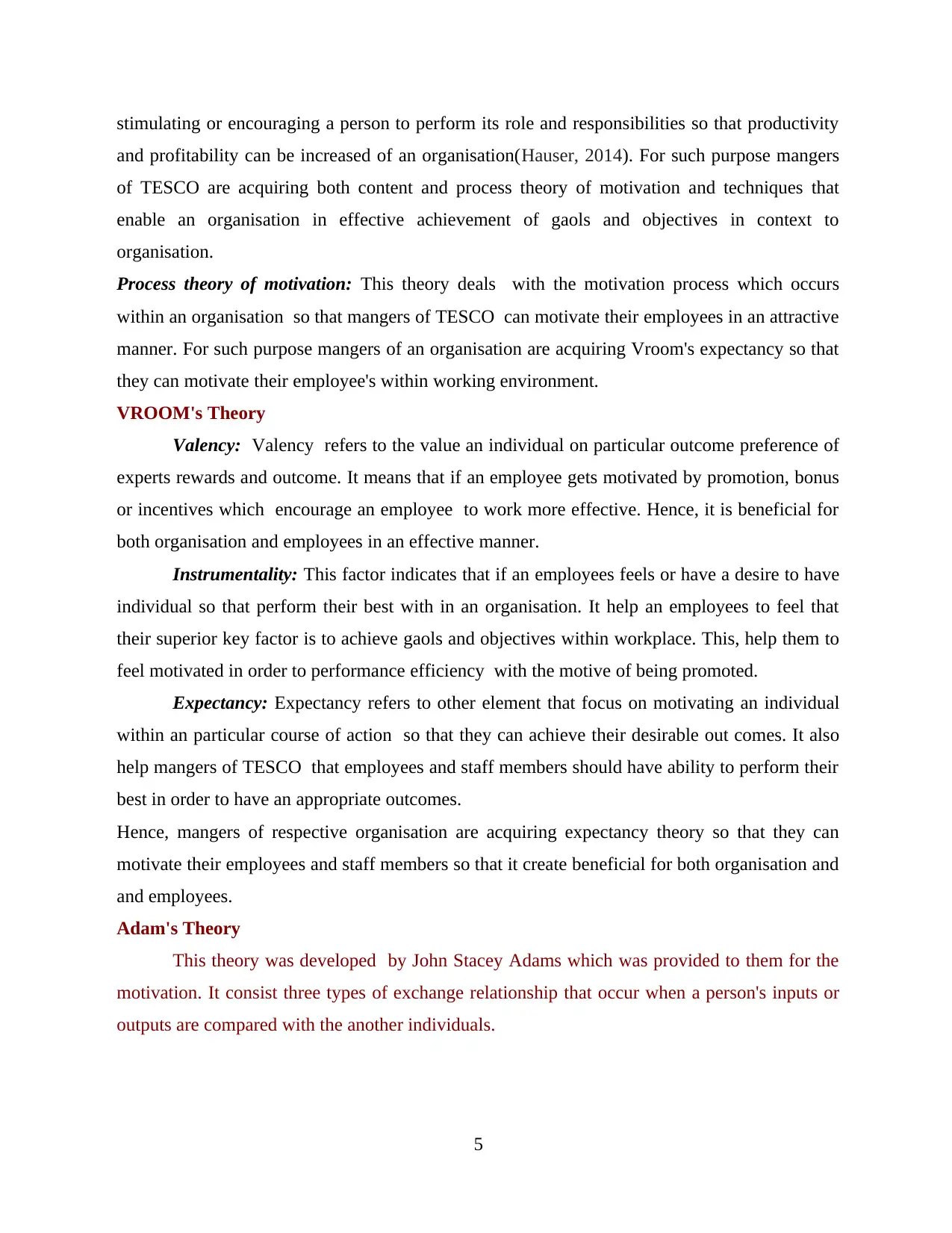
stimulating or encouraging a person to perform its role and responsibilities so that productivity
and profitability can be increased of an organisation(Hauser, 2014). For such purpose mangers
of TESCO are acquiring both content and process theory of motivation and techniques that
enable an organisation in effective achievement of gaols and objectives in context to
organisation.
Process theory of motivation: This theory deals with the motivation process which occurs
within an organisation so that mangers of TESCO can motivate their employees in an attractive
manner. For such purpose mangers of an organisation are acquiring Vroom's expectancy so that
they can motivate their employee's within working environment.
VROOM's Theory
Valency: Valency refers to the value an individual on particular outcome preference of
experts rewards and outcome. It means that if an employee gets motivated by promotion, bonus
or incentives which encourage an employee to work more effective. Hence, it is beneficial for
both organisation and employees in an effective manner.
Instrumentality: This factor indicates that if an employees feels or have a desire to have
individual so that perform their best with in an organisation. It help an employees to feel that
their superior key factor is to achieve gaols and objectives within workplace. This, help them to
feel motivated in order to performance efficiency with the motive of being promoted.
Expectancy: Expectancy refers to other element that focus on motivating an individual
within an particular course of action so that they can achieve their desirable out comes. It also
help mangers of TESCO that employees and staff members should have ability to perform their
best in order to have an appropriate outcomes.
Hence, mangers of respective organisation are acquiring expectancy theory so that they can
motivate their employees and staff members so that it create beneficial for both organisation and
and employees.
Adam's Theory
This theory was developed by John Stacey Adams which was provided to them for the
motivation. It consist three types of exchange relationship that occur when a person's inputs or
outputs are compared with the another individuals.
5
and profitability can be increased of an organisation(Hauser, 2014). For such purpose mangers
of TESCO are acquiring both content and process theory of motivation and techniques that
enable an organisation in effective achievement of gaols and objectives in context to
organisation.
Process theory of motivation: This theory deals with the motivation process which occurs
within an organisation so that mangers of TESCO can motivate their employees in an attractive
manner. For such purpose mangers of an organisation are acquiring Vroom's expectancy so that
they can motivate their employee's within working environment.
VROOM's Theory
Valency: Valency refers to the value an individual on particular outcome preference of
experts rewards and outcome. It means that if an employee gets motivated by promotion, bonus
or incentives which encourage an employee to work more effective. Hence, it is beneficial for
both organisation and employees in an effective manner.
Instrumentality: This factor indicates that if an employees feels or have a desire to have
individual so that perform their best with in an organisation. It help an employees to feel that
their superior key factor is to achieve gaols and objectives within workplace. This, help them to
feel motivated in order to performance efficiency with the motive of being promoted.
Expectancy: Expectancy refers to other element that focus on motivating an individual
within an particular course of action so that they can achieve their desirable out comes. It also
help mangers of TESCO that employees and staff members should have ability to perform their
best in order to have an appropriate outcomes.
Hence, mangers of respective organisation are acquiring expectancy theory so that they can
motivate their employees and staff members so that it create beneficial for both organisation and
and employees.
Adam's Theory
This theory was developed by John Stacey Adams which was provided to them for the
motivation. It consist three types of exchange relationship that occur when a person's inputs or
outputs are compared with the another individuals.
5
Paraphrase This Document
Need a fresh take? Get an instant paraphrase of this document with our AI Paraphraser
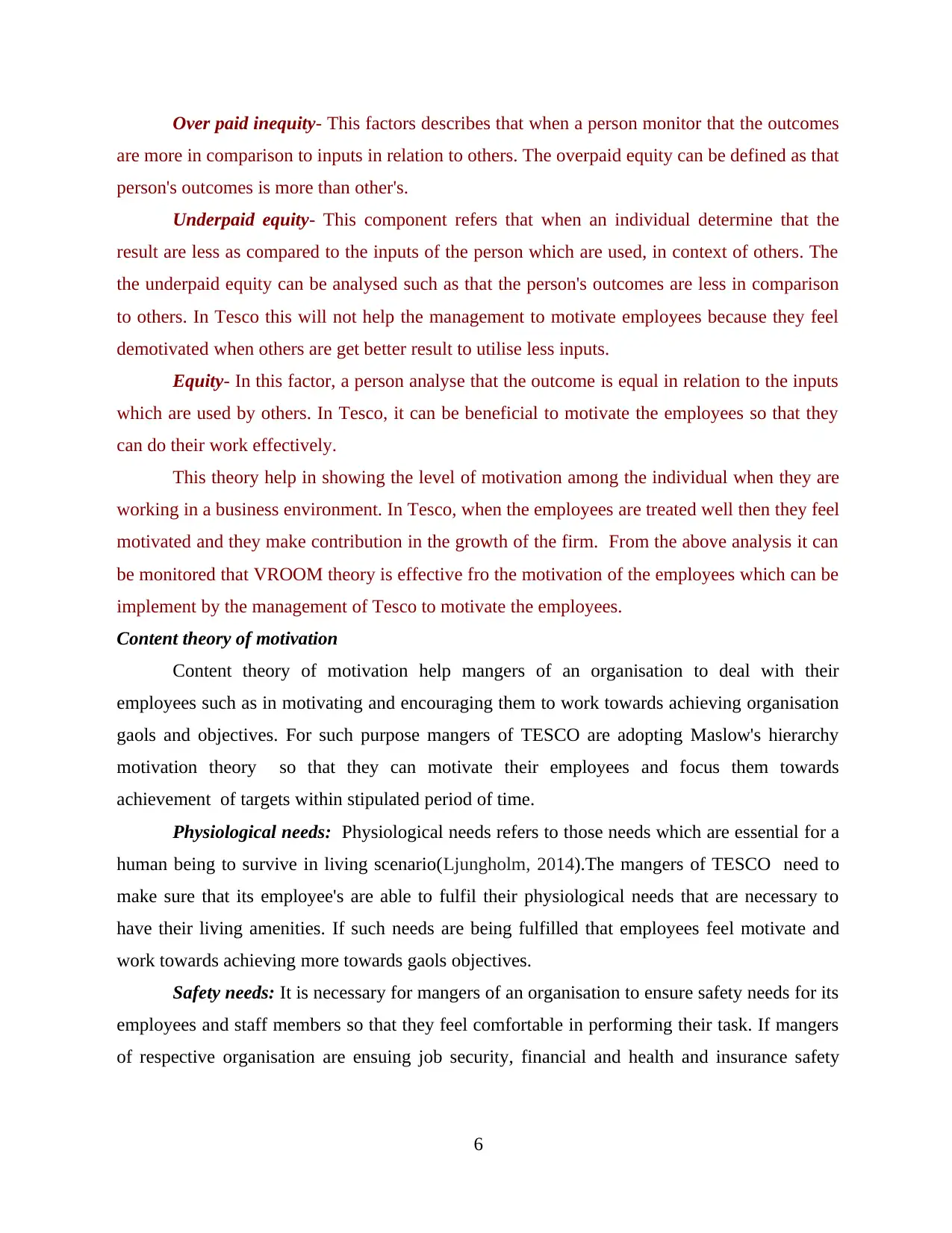
Over paid inequity- This factors describes that when a person monitor that the outcomes
are more in comparison to inputs in relation to others. The overpaid equity can be defined as that
person's outcomes is more than other's.
Underpaid equity- This component refers that when an individual determine that the
result are less as compared to the inputs of the person which are used, in context of others. The
the underpaid equity can be analysed such as that the person's outcomes are less in comparison
to others. In Tesco this will not help the management to motivate employees because they feel
demotivated when others are get better result to utilise less inputs.
Equity- In this factor, a person analyse that the outcome is equal in relation to the inputs
which are used by others. In Tesco, it can be beneficial to motivate the employees so that they
can do their work effectively.
This theory help in showing the level of motivation among the individual when they are
working in a business environment. In Tesco, when the employees are treated well then they feel
motivated and they make contribution in the growth of the firm. From the above analysis it can
be monitored that VROOM theory is effective fro the motivation of the employees which can be
implement by the management of Tesco to motivate the employees.
Content theory of motivation
Content theory of motivation help mangers of an organisation to deal with their
employees such as in motivating and encouraging them to work towards achieving organisation
gaols and objectives. For such purpose mangers of TESCO are adopting Maslow's hierarchy
motivation theory so that they can motivate their employees and focus them towards
achievement of targets within stipulated period of time.
Physiological needs: Physiological needs refers to those needs which are essential for a
human being to survive in living scenario(Ljungholm, 2014).The mangers of TESCO need to
make sure that its employee's are able to fulfil their physiological needs that are necessary to
have their living amenities. If such needs are being fulfilled that employees feel motivate and
work towards achieving more towards gaols objectives.
Safety needs: It is necessary for mangers of an organisation to ensure safety needs for its
employees and staff members so that they feel comfortable in performing their task. If mangers
of respective organisation are ensuing job security, financial and health and insurance safety
6
are more in comparison to inputs in relation to others. The overpaid equity can be defined as that
person's outcomes is more than other's.
Underpaid equity- This component refers that when an individual determine that the
result are less as compared to the inputs of the person which are used, in context of others. The
the underpaid equity can be analysed such as that the person's outcomes are less in comparison
to others. In Tesco this will not help the management to motivate employees because they feel
demotivated when others are get better result to utilise less inputs.
Equity- In this factor, a person analyse that the outcome is equal in relation to the inputs
which are used by others. In Tesco, it can be beneficial to motivate the employees so that they
can do their work effectively.
This theory help in showing the level of motivation among the individual when they are
working in a business environment. In Tesco, when the employees are treated well then they feel
motivated and they make contribution in the growth of the firm. From the above analysis it can
be monitored that VROOM theory is effective fro the motivation of the employees which can be
implement by the management of Tesco to motivate the employees.
Content theory of motivation
Content theory of motivation help mangers of an organisation to deal with their
employees such as in motivating and encouraging them to work towards achieving organisation
gaols and objectives. For such purpose mangers of TESCO are adopting Maslow's hierarchy
motivation theory so that they can motivate their employees and focus them towards
achievement of targets within stipulated period of time.
Physiological needs: Physiological needs refers to those needs which are essential for a
human being to survive in living scenario(Ljungholm, 2014).The mangers of TESCO need to
make sure that its employee's are able to fulfil their physiological needs that are necessary to
have their living amenities. If such needs are being fulfilled that employees feel motivate and
work towards achieving more towards gaols objectives.
Safety needs: It is necessary for mangers of an organisation to ensure safety needs for its
employees and staff members so that they feel comfortable in performing their task. If mangers
of respective organisation are ensuing job security, financial and health and insurance safety
6
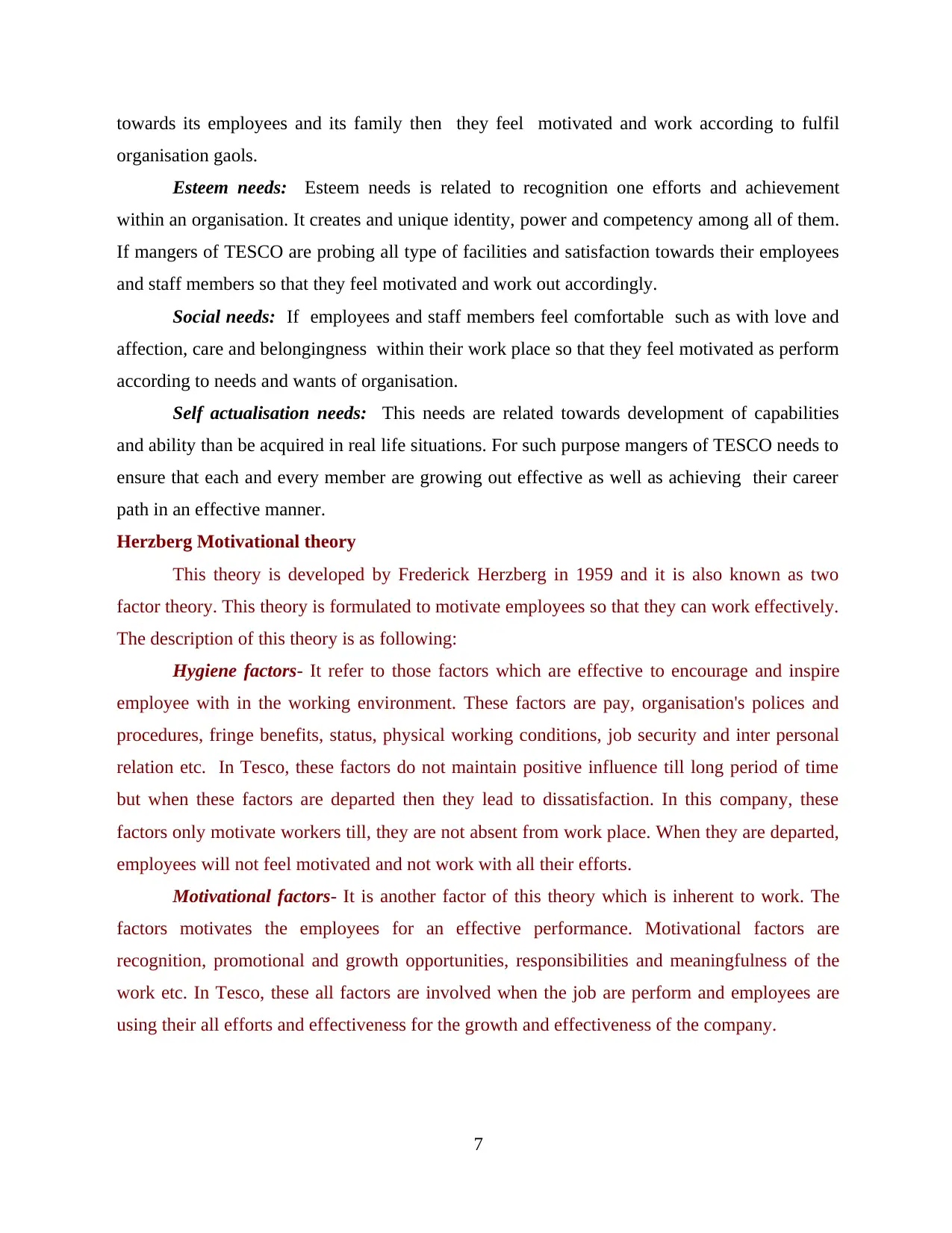
towards its employees and its family then they feel motivated and work according to fulfil
organisation gaols.
Esteem needs: Esteem needs is related to recognition one efforts and achievement
within an organisation. It creates and unique identity, power and competency among all of them.
If mangers of TESCO are probing all type of facilities and satisfaction towards their employees
and staff members so that they feel motivated and work out accordingly.
Social needs: If employees and staff members feel comfortable such as with love and
affection, care and belongingness within their work place so that they feel motivated as perform
according to needs and wants of organisation.
Self actualisation needs: This needs are related towards development of capabilities
and ability than be acquired in real life situations. For such purpose mangers of TESCO needs to
ensure that each and every member are growing out effective as well as achieving their career
path in an effective manner.
Herzberg Motivational theory
This theory is developed by Frederick Herzberg in 1959 and it is also known as two
factor theory. This theory is formulated to motivate employees so that they can work effectively.
The description of this theory is as following:
Hygiene factors- It refer to those factors which are effective to encourage and inspire
employee with in the working environment. These factors are pay, organisation's polices and
procedures, fringe benefits, status, physical working conditions, job security and inter personal
relation etc. In Tesco, these factors do not maintain positive influence till long period of time
but when these factors are departed then they lead to dissatisfaction. In this company, these
factors only motivate workers till, they are not absent from work place. When they are departed,
employees will not feel motivated and not work with all their efforts.
Motivational factors- It is another factor of this theory which is inherent to work. The
factors motivates the employees for an effective performance. Motivational factors are
recognition, promotional and growth opportunities, responsibilities and meaningfulness of the
work etc. In Tesco, these all factors are involved when the job are perform and employees are
using their all efforts and effectiveness for the growth and effectiveness of the company.
7
organisation gaols.
Esteem needs: Esteem needs is related to recognition one efforts and achievement
within an organisation. It creates and unique identity, power and competency among all of them.
If mangers of TESCO are probing all type of facilities and satisfaction towards their employees
and staff members so that they feel motivated and work out accordingly.
Social needs: If employees and staff members feel comfortable such as with love and
affection, care and belongingness within their work place so that they feel motivated as perform
according to needs and wants of organisation.
Self actualisation needs: This needs are related towards development of capabilities
and ability than be acquired in real life situations. For such purpose mangers of TESCO needs to
ensure that each and every member are growing out effective as well as achieving their career
path in an effective manner.
Herzberg Motivational theory
This theory is developed by Frederick Herzberg in 1959 and it is also known as two
factor theory. This theory is formulated to motivate employees so that they can work effectively.
The description of this theory is as following:
Hygiene factors- It refer to those factors which are effective to encourage and inspire
employee with in the working environment. These factors are pay, organisation's polices and
procedures, fringe benefits, status, physical working conditions, job security and inter personal
relation etc. In Tesco, these factors do not maintain positive influence till long period of time
but when these factors are departed then they lead to dissatisfaction. In this company, these
factors only motivate workers till, they are not absent from work place. When they are departed,
employees will not feel motivated and not work with all their efforts.
Motivational factors- It is another factor of this theory which is inherent to work. The
factors motivates the employees for an effective performance. Motivational factors are
recognition, promotional and growth opportunities, responsibilities and meaningfulness of the
work etc. In Tesco, these all factors are involved when the job are perform and employees are
using their all efforts and effectiveness for the growth and effectiveness of the company.
7
⊘ This is a preview!⊘
Do you want full access?
Subscribe today to unlock all pages.

Trusted by 1+ million students worldwide
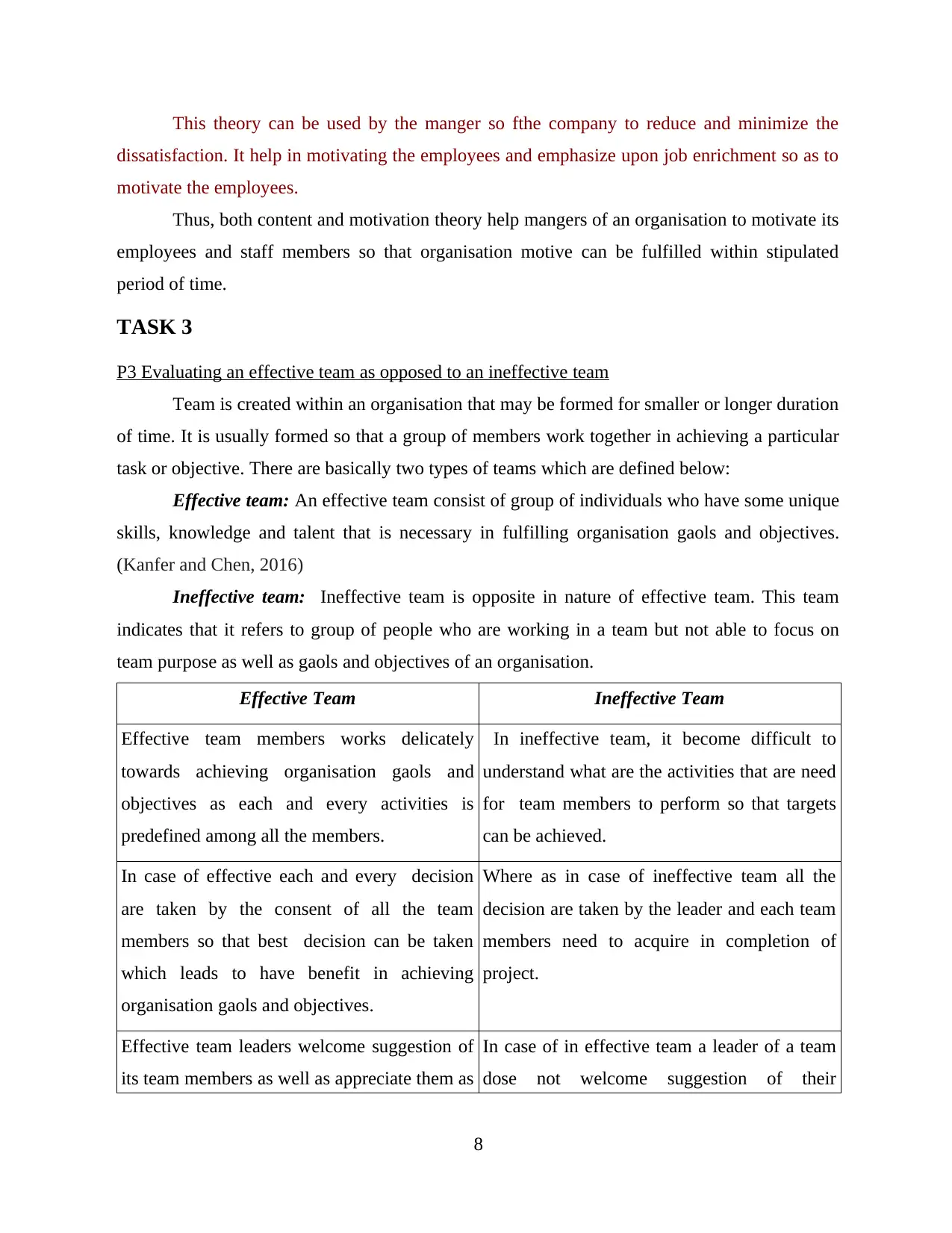
This theory can be used by the manger so fthe company to reduce and minimize the
dissatisfaction. It help in motivating the employees and emphasize upon job enrichment so as to
motivate the employees.
Thus, both content and motivation theory help mangers of an organisation to motivate its
employees and staff members so that organisation motive can be fulfilled within stipulated
period of time.
TASK 3
P3 Evaluating an effective team as opposed to an ineffective team
Team is created within an organisation that may be formed for smaller or longer duration
of time. It is usually formed so that a group of members work together in achieving a particular
task or objective. There are basically two types of teams which are defined below:
Effective team: An effective team consist of group of individuals who have some unique
skills, knowledge and talent that is necessary in fulfilling organisation gaols and objectives.
(Kanfer and Chen, 2016)
Ineffective team: Ineffective team is opposite in nature of effective team. This team
indicates that it refers to group of people who are working in a team but not able to focus on
team purpose as well as gaols and objectives of an organisation.
Effective Team Ineffective Team
Effective team members works delicately
towards achieving organisation gaols and
objectives as each and every activities is
predefined among all the members.
In ineffective team, it become difficult to
understand what are the activities that are need
for team members to perform so that targets
can be achieved.
In case of effective each and every decision
are taken by the consent of all the team
members so that best decision can be taken
which leads to have benefit in achieving
organisation gaols and objectives.
Where as in case of ineffective team all the
decision are taken by the leader and each team
members need to acquire in completion of
project.
Effective team leaders welcome suggestion of
its team members as well as appreciate them as
In case of in effective team a leader of a team
dose not welcome suggestion of their
8
dissatisfaction. It help in motivating the employees and emphasize upon job enrichment so as to
motivate the employees.
Thus, both content and motivation theory help mangers of an organisation to motivate its
employees and staff members so that organisation motive can be fulfilled within stipulated
period of time.
TASK 3
P3 Evaluating an effective team as opposed to an ineffective team
Team is created within an organisation that may be formed for smaller or longer duration
of time. It is usually formed so that a group of members work together in achieving a particular
task or objective. There are basically two types of teams which are defined below:
Effective team: An effective team consist of group of individuals who have some unique
skills, knowledge and talent that is necessary in fulfilling organisation gaols and objectives.
(Kanfer and Chen, 2016)
Ineffective team: Ineffective team is opposite in nature of effective team. This team
indicates that it refers to group of people who are working in a team but not able to focus on
team purpose as well as gaols and objectives of an organisation.
Effective Team Ineffective Team
Effective team members works delicately
towards achieving organisation gaols and
objectives as each and every activities is
predefined among all the members.
In ineffective team, it become difficult to
understand what are the activities that are need
for team members to perform so that targets
can be achieved.
In case of effective each and every decision
are taken by the consent of all the team
members so that best decision can be taken
which leads to have benefit in achieving
organisation gaols and objectives.
Where as in case of ineffective team all the
decision are taken by the leader and each team
members need to acquire in completion of
project.
Effective team leaders welcome suggestion of
its team members as well as appreciate them as
In case of in effective team a leader of a team
dose not welcome suggestion of their
8
Paraphrase This Document
Need a fresh take? Get an instant paraphrase of this document with our AI Paraphraser
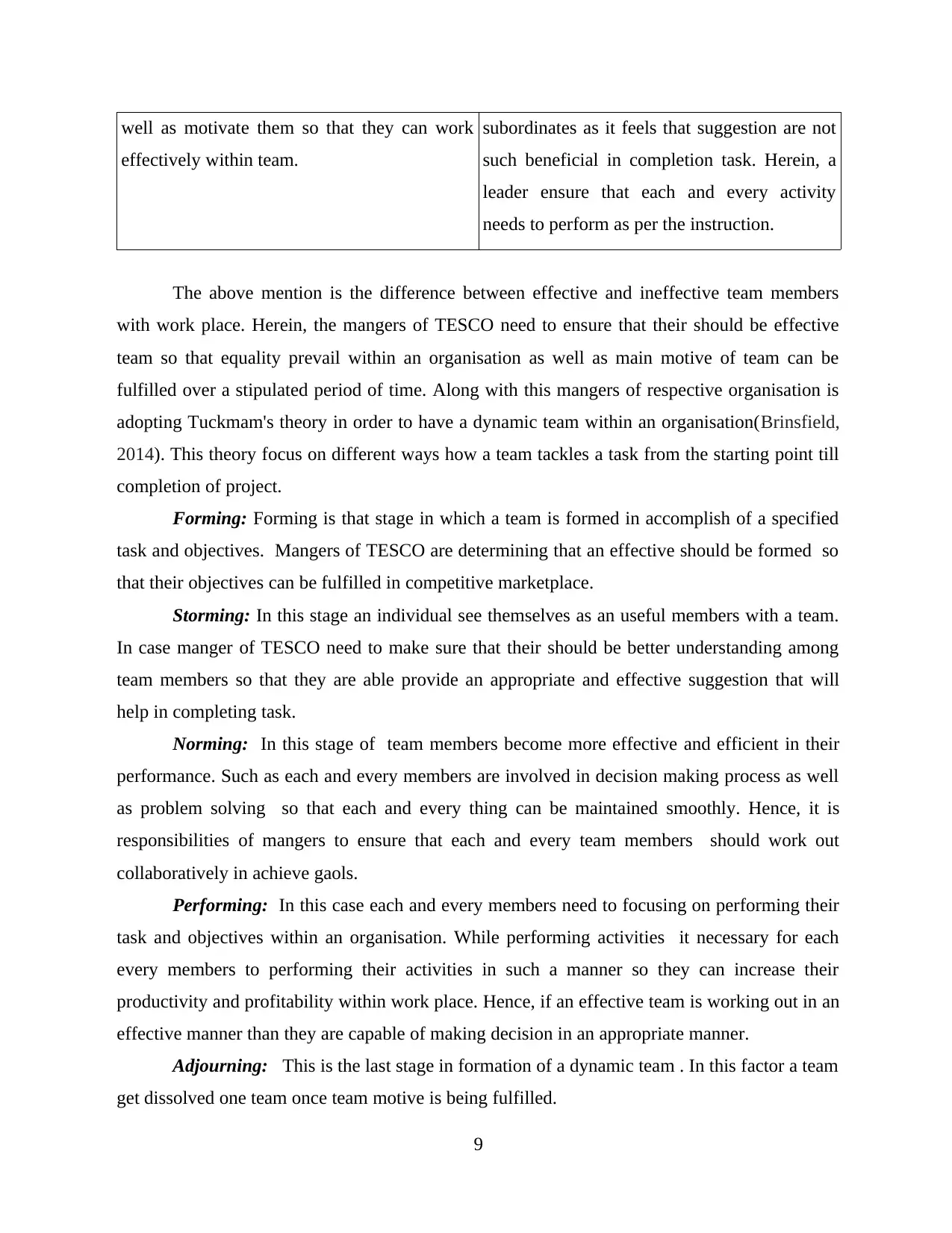
well as motivate them so that they can work
effectively within team.
subordinates as it feels that suggestion are not
such beneficial in completion task. Herein, a
leader ensure that each and every activity
needs to perform as per the instruction.
The above mention is the difference between effective and ineffective team members
with work place. Herein, the mangers of TESCO need to ensure that their should be effective
team so that equality prevail within an organisation as well as main motive of team can be
fulfilled over a stipulated period of time. Along with this mangers of respective organisation is
adopting Tuckmam's theory in order to have a dynamic team within an organisation(Brinsfield,
2014). This theory focus on different ways how a team tackles a task from the starting point till
completion of project.
Forming: Forming is that stage in which a team is formed in accomplish of a specified
task and objectives. Mangers of TESCO are determining that an effective should be formed so
that their objectives can be fulfilled in competitive marketplace.
Storming: In this stage an individual see themselves as an useful members with a team.
In case manger of TESCO need to make sure that their should be better understanding among
team members so that they are able provide an appropriate and effective suggestion that will
help in completing task.
Norming: In this stage of team members become more effective and efficient in their
performance. Such as each and every members are involved in decision making process as well
as problem solving so that each and every thing can be maintained smoothly. Hence, it is
responsibilities of mangers to ensure that each and every team members should work out
collaboratively in achieve gaols.
Performing: In this case each and every members need to focusing on performing their
task and objectives within an organisation. While performing activities it necessary for each
every members to performing their activities in such a manner so they can increase their
productivity and profitability within work place. Hence, if an effective team is working out in an
effective manner than they are capable of making decision in an appropriate manner.
Adjourning: This is the last stage in formation of a dynamic team . In this factor a team
get dissolved one team once team motive is being fulfilled.
9
effectively within team.
subordinates as it feels that suggestion are not
such beneficial in completion task. Herein, a
leader ensure that each and every activity
needs to perform as per the instruction.
The above mention is the difference between effective and ineffective team members
with work place. Herein, the mangers of TESCO need to ensure that their should be effective
team so that equality prevail within an organisation as well as main motive of team can be
fulfilled over a stipulated period of time. Along with this mangers of respective organisation is
adopting Tuckmam's theory in order to have a dynamic team within an organisation(Brinsfield,
2014). This theory focus on different ways how a team tackles a task from the starting point till
completion of project.
Forming: Forming is that stage in which a team is formed in accomplish of a specified
task and objectives. Mangers of TESCO are determining that an effective should be formed so
that their objectives can be fulfilled in competitive marketplace.
Storming: In this stage an individual see themselves as an useful members with a team.
In case manger of TESCO need to make sure that their should be better understanding among
team members so that they are able provide an appropriate and effective suggestion that will
help in completing task.
Norming: In this stage of team members become more effective and efficient in their
performance. Such as each and every members are involved in decision making process as well
as problem solving so that each and every thing can be maintained smoothly. Hence, it is
responsibilities of mangers to ensure that each and every team members should work out
collaboratively in achieve gaols.
Performing: In this case each and every members need to focusing on performing their
task and objectives within an organisation. While performing activities it necessary for each
every members to performing their activities in such a manner so they can increase their
productivity and profitability within work place. Hence, if an effective team is working out in an
effective manner than they are capable of making decision in an appropriate manner.
Adjourning: This is the last stage in formation of a dynamic team . In this factor a team
get dissolved one team once team motive is being fulfilled.
9
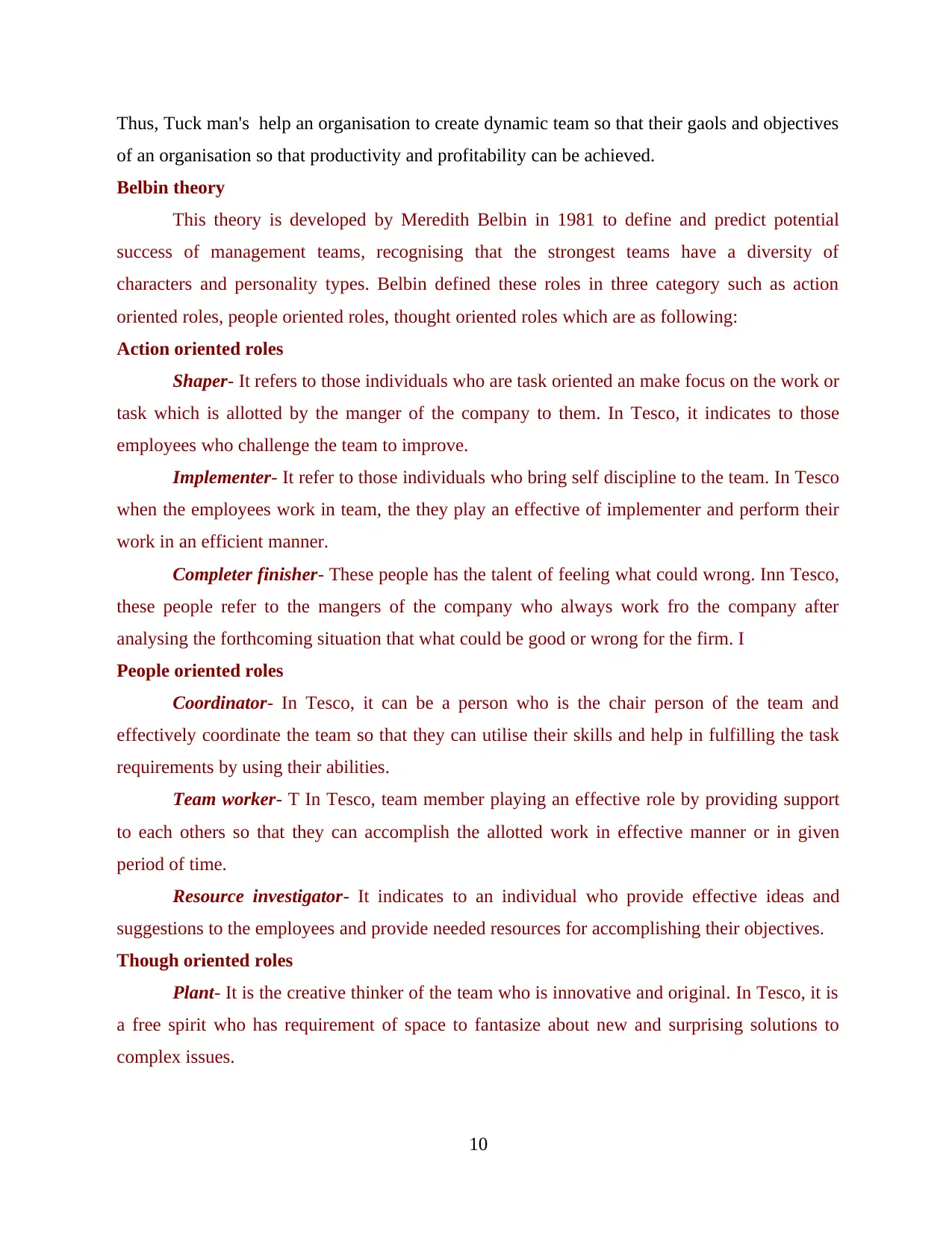
Thus, Tuck man's help an organisation to create dynamic team so that their gaols and objectives
of an organisation so that productivity and profitability can be achieved.
Belbin theory
This theory is developed by Meredith Belbin in 1981 to define and predict potential
success of management teams, recognising that the strongest teams have a diversity of
characters and personality types. Belbin defined these roles in three category such as action
oriented roles, people oriented roles, thought oriented roles which are as following:
Action oriented roles
Shaper- It refers to those individuals who are task oriented an make focus on the work or
task which is allotted by the manger of the company to them. In Tesco, it indicates to those
employees who challenge the team to improve.
Implementer- It refer to those individuals who bring self discipline to the team. In Tesco
when the employees work in team, the they play an effective of implementer and perform their
work in an efficient manner.
Completer finisher- These people has the talent of feeling what could wrong. Inn Tesco,
these people refer to the mangers of the company who always work fro the company after
analysing the forthcoming situation that what could be good or wrong for the firm. I
People oriented roles
Coordinator- In Tesco, it can be a person who is the chair person of the team and
effectively coordinate the team so that they can utilise their skills and help in fulfilling the task
requirements by using their abilities.
Team worker- T In Tesco, team member playing an effective role by providing support
to each others so that they can accomplish the allotted work in effective manner or in given
period of time.
Resource investigator- It indicates to an individual who provide effective ideas and
suggestions to the employees and provide needed resources for accomplishing their objectives.
Though oriented roles
Plant- It is the creative thinker of the team who is innovative and original. In Tesco, it is
a free spirit who has requirement of space to fantasize about new and surprising solutions to
complex issues.
10
of an organisation so that productivity and profitability can be achieved.
Belbin theory
This theory is developed by Meredith Belbin in 1981 to define and predict potential
success of management teams, recognising that the strongest teams have a diversity of
characters and personality types. Belbin defined these roles in three category such as action
oriented roles, people oriented roles, thought oriented roles which are as following:
Action oriented roles
Shaper- It refers to those individuals who are task oriented an make focus on the work or
task which is allotted by the manger of the company to them. In Tesco, it indicates to those
employees who challenge the team to improve.
Implementer- It refer to those individuals who bring self discipline to the team. In Tesco
when the employees work in team, the they play an effective of implementer and perform their
work in an efficient manner.
Completer finisher- These people has the talent of feeling what could wrong. Inn Tesco,
these people refer to the mangers of the company who always work fro the company after
analysing the forthcoming situation that what could be good or wrong for the firm. I
People oriented roles
Coordinator- In Tesco, it can be a person who is the chair person of the team and
effectively coordinate the team so that they can utilise their skills and help in fulfilling the task
requirements by using their abilities.
Team worker- T In Tesco, team member playing an effective role by providing support
to each others so that they can accomplish the allotted work in effective manner or in given
period of time.
Resource investigator- It indicates to an individual who provide effective ideas and
suggestions to the employees and provide needed resources for accomplishing their objectives.
Though oriented roles
Plant- It is the creative thinker of the team who is innovative and original. In Tesco, it is
a free spirit who has requirement of space to fantasize about new and surprising solutions to
complex issues.
10
⊘ This is a preview!⊘
Do you want full access?
Subscribe today to unlock all pages.

Trusted by 1+ million students worldwide
1 out of 16
Related Documents
Your All-in-One AI-Powered Toolkit for Academic Success.
+13062052269
info@desklib.com
Available 24*7 on WhatsApp / Email
![[object Object]](/_next/static/media/star-bottom.7253800d.svg)
Unlock your academic potential
Copyright © 2020–2026 A2Z Services. All Rights Reserved. Developed and managed by ZUCOL.





